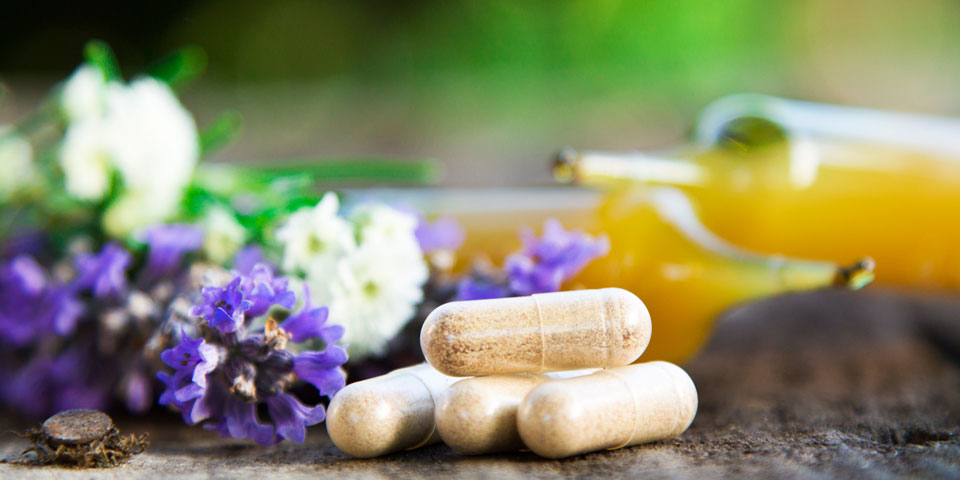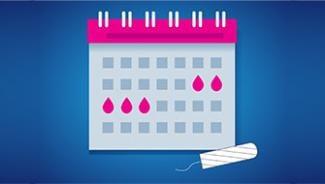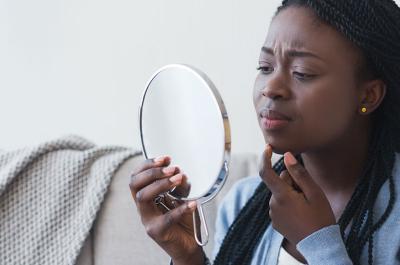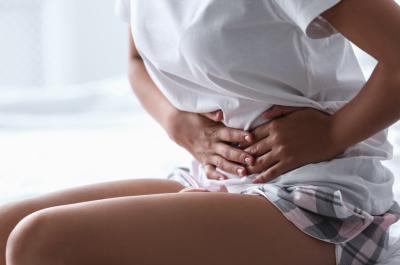PMS supplements: An introduction to ingredients that might help, and why

Premenstrual syndrome (or PMS) can affect you in more ways than one, from aches and pains to mood swings. As part of the quest to feel better on your period and during PMS, you might wonder about dietary supplements that claim they provide some relief from PMS symptoms. Let’s explore the science behind common supplement ingredients, how they may be tied to PMS relief and what to discuss with your doctor if you’d like to add supplements to your self-care routine.
Talking to your doctor is especially important if you have concerns about existing health conditions. And while we’re talking specifically about PMS supplements here, discussing general supplement concerns with your doctor is also important if you are pregnant, trying to conceive or nursing.
What are PMS supplements?
In general, dietary supplements are designed to help support your body and health. They can contain minerals, herbs or other active ingredients to manage specific symptoms.
PMS supplements are designed to help relieve symptoms you may experience before your period. Since PMS symptoms vary from person to person (and sometimes even from month to month), we’ve organized supplement ingredients by the symptoms you might be looking to relieve.
Supplements for menstrual cramps
Vitamin E
Vitamin E’s role in cramp management relates to where menstrual cramps (also called dysmenorrhea) can come from in the first place. In the luteal phase of your menstrual cycle, your body produces more of the hormone progesterone to thicken the uterine lining and prepare it for the potential implantation of a fertilized egg. If an implantation doesn’t occur, your progesterone levels decrease, prompting your body to shed that lining (and start your period). Studies show that this decrease can also trigger chemical changes that lead to an increased production of lipids called prostaglandins, which can be one of the major causes of uterine cramps.1
Vitamin E’s antioxidant properties can help reduce or even prevent some of the initial chemical changes that increase the production of prostaglandins.1 In one study, Vitamin E taken daily just before and during the first days of a subject’s period helped reduce the severity of their menstrual cramps.1
Vitamin D
Vitamin D is well known for its connection to calcium absorption, and calcium doesn’t just relate to bone health — one study found that vitamin D and calcium could also impact your cramps. Calcium plays a role in reducing muscle contractions, and low levels of calcium can intensify menstrual cramps.1 Vitamin D can help support healthy calcium regulation, which means vitamin D could also help improve cramping from PMS.1
(We discuss calcium’s multiple PMS-managing benefits below, but while you’re thinking about the importance of vitamin D, it’s a good idea to make sure you’re getting enough calcium, too!)
Ginger
The science behind ginger’s role in cramp management is complex and still being explored, but studies indicate that its anti-inflammatory properties may inhibit prostaglandin production, which could mean less painful cramping for you.1,2
Vitamin B1 (thiamin)
Vitamin B1 plays an important role in healthy neural activity and muscle function, and some research has found that it can help decrease dysmenorrhea (painful periods) and common PMS symptoms.3 Cramps are essentially painful muscle contractions, and vitamin B1 supports your neuromuscular system. More research is needed to confirm just how much of an impact the vitamin can have on PMS, but checking that you’re getting enough thiamin might make a difference in your PMS symptoms.
Supplements for breast pain
Chasteberry
Chasteberry has been used for centuries in herbal treatments for various gynecological and skin conditions.4 Today, you can often find chasteberry in supplements related to reproductive and feminine health, though it may be listed under its more scientific name, Vitex agnus-castus.
Studies conducted on chasteberry extract suggest this supplement can have a positive impact on several PMS symptoms, and PMS-related breast pain and tenderness in particular.5 But more research on this is needed to determine how effective it is.4
With chasteberry, safety is a concern you’ll want to talk about with your doctor. It may not be safe to take chasteberry if you have a hormone-sensitive health condition (e.g., uterine, breast or ovarian cancer) or if you’re on certain medications it may interact with (e.g., birth control pills, Parkinson’s disease treatments or psychosis treatments).4 It also may not be safe to take chasteberry while breast feeding or during pregnancy.4 Talk to your doctor about these risks if you’re considering taking a supplement that contains chasteberry.
Supplements to reduce the severity of PMS symptoms
Ginkgo biloba
Ginkgo biloba is a common supplement ingredient taken around the world with the goal of getting relief from a wide variety of health conditions.6 There’s evidence to suggest that Ginkgo biloba may help reduce the overall severity of PMS symptoms, but more research is needed to determine how effective it is.7
If you are considering this supplement, talk to your doctor first to determine if it’s right for you. Be sure to get their advice about recommended dosage and any potential side effects or interactions it may have with other medicines you take.
Evening primrose oil
Evening primrose oil (EPO) has been used in association with many women’s health conditions, including PMS,8 so you may have heard of it before and wondered how effective it could be for you. Some studies have shown that taking EPO daily could help reduce PMS symptom severity.8 But the jury is still out on how effective this supplement really is.9
If you’re considering taking evening primrose oil, be sure to talk to your doctor first. It can have interactions with prescription medicines, and it’s best to skip it if you have a bleeding disorder or are planning to have surgery soon.9 This supplement might also increase the risk of complications in pregnancy, so if you’re trying to conceive or may become pregnant, talk to your doctor about those risks.9
Supplements for multiple PMS symptoms
Calcium
It’s not just for your bones. One study suggests that calcium could help with several aspects of PMS, from water retention to depression, as early as the second cycle after beginning to take regular supplemental calcium.10
Talk with your doctor to be sure you’re taking the right level of calcium. And keep in mind that health conditions like hypercalcemia could mean calcium supplements aren’t the right choice for you.11
Magnesium with vitamin B6
One study found that combining magnesium and vitamin B6 may help relieve a long list of PMS symptoms: water retention (which can cause bloating and breast tenderness), PMS-related mood and mental health issues, low back pain, headache, acne, muscular pain and more.12
Are PMS supplements safe?
When taken appropriately, PMS supplements may be an effective way to get relief from some PMS symptoms. But they can have potentially serious side effects and may interact with other medications you take. “Natural” remedies aren’t necessarily risk-free. That’s why it’s essential to...
Ask your doctor before taking PMS supplements
Why is it so important to talk to your doctor? Simply put: potential interactions and side effects. Ingredients in any supplement you choose could have side effects or could interact with prescriptions or over-the-counter medications.13
It’s always a good idea to talk with your doctor about PMS symptoms you’re experiencing and the steps you’d like to take to address them. That includes choosing supplements to add to your healthcare routine.
Here are some steps to take (with your doctor’s support) if you’re ready to try a PMS supplement:
- Determine which PMS symptoms you’re hoping to relieve with a supplement.
- Work with your doctor to identify what ingredients might help with those symptoms.
- Choose a PMS supplement and check the full ingredients list for any potential issues.
- Follow the label instructions and stick to the recommended dosage — often labels will advise on details like taking it with food or a full glass of water.
- Track how well it’s working and watch for side effects.
Remember: PMS supplements are meant to “supplement” a healthy lifestyle. By tracking your period and jotting down any symptoms you have, you can get a better idea of what to expect when your period’s on the way. And the more you know about your body, the sooner you can take steps to look after yourself before, during and after your period.
Sources :
- Pakniat H, Chegini V, Ranjkesh F, Hosseini MA. Comparison of the effect of vitamin E, vitamin D and ginger on the severity of primary dysmenorrhea: a single-blind clinical trial. Obstet Gynecol Sci. 2019;62(6):462-468. doi: 10.5468/ogs.2019.62.6.462. Accessed January 12, 2023.https://www.ncbi.nlm.nih.gov/pmc/articles/PMC6856484
-
Rahnama P, Montazeri A, Huseini HF, Kianbakht S, Naseri M. Effect of Zingiber officinale R. rhizomes (ginger) on pain relief in primary dysmenorrhea: a placebo randomized trial. BMC Complement Altern Med. 2012;12:92. doi: 10.1186/1472-6882-12-92. Accessed January 12, 2023. https://www.ncbi.nlm.nih.gov/pmc/articles/PMC3518208/
-
Abdollahifard S, Rahmanian Koshkaki A, Moazamiyanfar R. The effects of vitamin B1 on ameliorating the premenstrual syndrome symptoms. Glob J Health Sci. 2014;6(6):144-153. doi: 10.5539/gjhs.v6n6p144. Accessed January 12, 2023. https://www.ncbi.nlm.nih.gov/pmc/articles/PMC4825494/
-
National Center for Complementary and Integrative Health. Chasteberry. Updated July 2020. Accessed January 12, 2023. https://www.nccih.nih.gov/health/chasteberry
-
Rafieian-Kopaei M, Movahedi M. Systematic review of premenstrual, postmenstrual and infertility disorders of vitex agnus castus. Electron Physician. 2017;9(1):3685-3689. doi: 10.19082/3685. Accessed January 12, 2023. https://www.ncbi.nlm.nih.gov/pmc/articles/PMC5308513/
-
Nguyen T, Alzahrani T. Ginkgo Biloba. In: StatPearls. Treasure Island (FL): StatPearls Publishing; Jan, 2022. Updated July 4, 2022. Accessed January 12, 2023. https://www.ncbi.nlm.nih.gov/books/NBK541024/
-
Ozgoli G, Selselei EA, Mojab F, Majd HA. A randomized, placebo-controlled trial of Ginkgo biloba L. in treatment of premenstrual syndrome. J Altern Complement Med. 2009;15(8):845-851. doi: 10.1089/acm.2008.0493. Accessed January 12, 2023. https://pubmed.ncbi.nlm.nih.gov/19678774/
-
Mahboubi M. Evening primrose (Oenothera biennis) oil in management of female ailments. J Menopausal Med. 2019;25(2):74-82. doi: 10.6118/jmm.18190. Accessed January 12, 2023. https://www.ncbi.nlm.nih.gov/pmc/articles/PMC6718646/
-
Mayo Clinic. Evening primrose. Updated November 13, 2020. Accessed January 12, 2023. https://www.mayoclinic.org/drugs-supplements-evening-primrose/art-20364500
-
Shobeiri F, Araste FE, Ebrahimi R, Jenabi E, Nazari M. Effect of calcium on premenstrual syndrome: a double-blind randomized clinical trial. Obstet Gynecol Sci. 2017;60(1):100-105. doi: 10.5468/ogs.2017.60.1.100. Accessed January 12, 2023. https://www.ncbi.nlm.nih.gov/pmc/articles/PMC5313351/
-
Mayo Clinic. Calcium and calcium supplements: achieving the right balance. Updated November 1, 2022. Accessed January 12, 2023. https://www.mayoclinic.org/healthy-lifestyle/nutrition-and-healthy-eating/in-depth/calcium-supplements/art-20047097
-
Fathizadeh N, Ebrahimi E, Valiani M, Tavakoli N, Yar MH. Evaluating the effect of magnesium and magnesium plus vitamin B6 supplement on the severity of premenstrual syndrome. Iran J Nurs Midwifery Res. 2010;15(Suppl 1):401-405. Accessed January 12, 2023. https://www.ncbi.nlm.nih.gov/pmc/articles/PMC3208934/
-
National Institutes of Health. Dietary supplements: what you need to know. Updated January 4, 2023. Accessed January 12, 2023. https://ods.od.nih.gov/factsheets/WYNTK-Consumer/

All you need to know about your period
Even if you get your period every month, how much do you really know about periods?

Why is my period late?
Missing your period can be stressful. You worry about whether you’re pregnant or not, or whether there is something wrong with you. However, many factors, like stress, can cause your period to arrive late.




